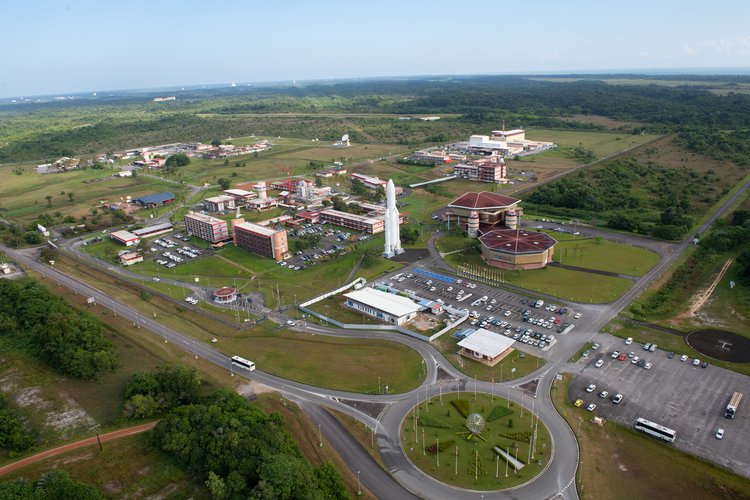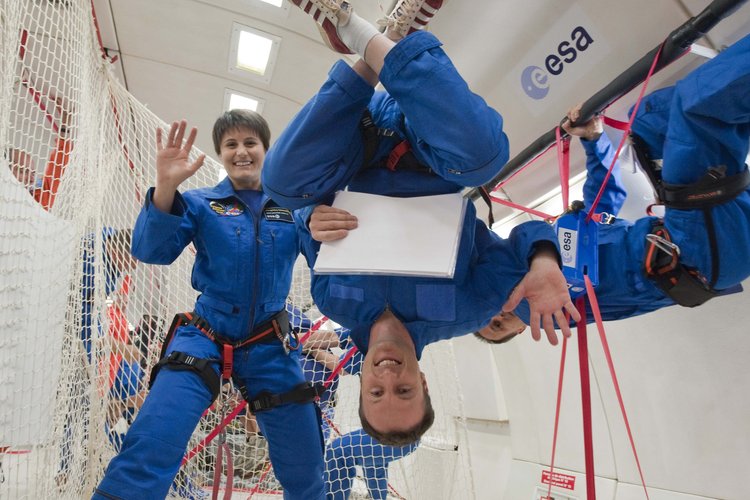
Copernical Team
Europe's Spaceport: industrial service contract opportunities

ESA is inviting European space and non-space companies to get involved in the industrial service contracts of the French space agency, CNES, in its operational and maintenance activities at Europe’s Spaceport in French Guiana.
Watch live: joint call with ESA astronauts Samantha Cristoforetti and Matthias Maurer in orbit

What’s better than one ESA astronaut on the International Space Station? Two ESA astronauts on the Space Station! And they’ll be in conversation with ESA Director General Josef Aschbacher, Head of the German space agency DLR Walther Pelzer and Head of the Italian apace agency ASI Giorgio Saccoccia today.
Purdue and Duke Energy to explore potential for clean, nuclear power source for campus
 Purdue University and Duke Energy announced today (April 27) that they plan to jointly explore the feasibility of using advanced nuclear energy to meet the campus community's long-term energy needs.
With interest rising worldwide in new technologies that are reliable and carbon-free, Purdue and Duke Energy intend to study power produced through Small Modular Reactors (SMRs), a move that ma
Purdue University and Duke Energy announced today (April 27) that they plan to jointly explore the feasibility of using advanced nuclear energy to meet the campus community's long-term energy needs.
With interest rising worldwide in new technologies that are reliable and carbon-free, Purdue and Duke Energy intend to study power produced through Small Modular Reactors (SMRs), a move that ma In Einstein's footsteps and beyond
 In physics, as in life, it's always good to look at things from different perspectives.
Since the beginning of quantum physics, how light moves and interacts with matter around it has mostly been described and understood mathematically through the lens of its energy. In 1900, Max Planck used energy to explain how light is emitted by heated objects, a seminal study in the foundation of quan
In physics, as in life, it's always good to look at things from different perspectives.
Since the beginning of quantum physics, how light moves and interacts with matter around it has mostly been described and understood mathematically through the lens of its energy. In 1900, Max Planck used energy to explain how light is emitted by heated objects, a seminal study in the foundation of quan NASA scientist discovers new means to measure snow depth from space
 A NASA scientist is adding a new dimension to the climate-observing powers of a satellite instrument whose main mission is to measure the height of Earth's ice sheets and sea ice. And the inspiration for this new method comes from how ants walk around their colonies.
Using a concept adapted from the mathematics and biology communities, Yongxiang Hu of NASA's Langley Research Center in Hamp
A NASA scientist is adding a new dimension to the climate-observing powers of a satellite instrument whose main mission is to measure the height of Earth's ice sheets and sea ice. And the inspiration for this new method comes from how ants walk around their colonies.
Using a concept adapted from the mathematics and biology communities, Yongxiang Hu of NASA's Langley Research Center in Hamp Earth's atmosphere may be source of some lunar water
 Hydrogen and oxygen ions escaping from Earth's upper atmosphere and combining on the moon could be one of the sources of the known lunar water and ice, according to new research by University of Alaska Fairbanks Geophysical Institute scientists.
The work led by UAF Geophysical Institute associate research professor Gunther Kletetschka adds to a growing body of research about water at the m
Hydrogen and oxygen ions escaping from Earth's upper atmosphere and combining on the moon could be one of the sources of the known lunar water and ice, according to new research by University of Alaska Fairbanks Geophysical Institute scientists.
The work led by UAF Geophysical Institute associate research professor Gunther Kletetschka adds to a growing body of research about water at the m AFRL, ABL Space Systems demonstrate rapid operation of launch systems
 The Air Force Research Laboratory, or AFRL, and ABL Space Systems are collaborating to demonstrate how launch systems can be operated rapidly by small teams from nontraditional sites. Leveraging ABL's deployable ground system, GS0, and small launch vehicle, RS1, a series of ground demonstrations is underway at multiple U.S. military installations aimed at quick
The Air Force Research Laboratory, or AFRL, and ABL Space Systems are collaborating to demonstrate how launch systems can be operated rapidly by small teams from nontraditional sites. Leveraging ABL's deployable ground system, GS0, and small launch vehicle, RS1, a series of ground demonstrations is underway at multiple U.S. military installations aimed at quick Blue Canyon Technologies expands into GEO with its first cubesat
 Small satellite manufacturer and mission services provider Blue Canyon Technologies LLC ("BCT" or "Blue Canyon"), a wholly-owned subsidiary of Raytheon Technologies, assisted in the deployment of Ascent, the company's first CubeSat spacecraft bus launched to a geostationary, or GEO, orbit by the Air Force Research Laboratory as part of the U.S. Space Force's Test Program-3 mission.
Blue Ca
Small satellite manufacturer and mission services provider Blue Canyon Technologies LLC ("BCT" or "Blue Canyon"), a wholly-owned subsidiary of Raytheon Technologies, assisted in the deployment of Ascent, the company's first CubeSat spacecraft bus launched to a geostationary, or GEO, orbit by the Air Force Research Laboratory as part of the U.S. Space Force's Test Program-3 mission.
Blue Ca What is CAPSTONE?
 A microwave oven-sized CubeSat weighing just 55 pounds will serve as the first spacecraft to test a unique, elliptical lunar orbit as part of the Cislunar Autonomous Positioning System Technology Operations and Navigation Experiment (CAPSTONE). As a pathfinder for Gateway, a Moon-orbiting outpost that is part of NASA's Artemis program, CAPSTONE will help reduce risk for future spacecraft by vali
A microwave oven-sized CubeSat weighing just 55 pounds will serve as the first spacecraft to test a unique, elliptical lunar orbit as part of the Cislunar Autonomous Positioning System Technology Operations and Navigation Experiment (CAPSTONE). As a pathfinder for Gateway, a Moon-orbiting outpost that is part of NASA's Artemis program, CAPSTONE will help reduce risk for future spacecraft by vali Spinning stars shed new light on strange galactic signal
 Researchers from The Australian National University (ANU) have found an alternative explanation for a mysterious gamma-ray signal coming from the centre of the galaxy, which was long claimed as a signature of dark matter.
Gamma-rays are the form of electromagnetic radiation with the shortest wavelength and highest energy.
Co-author of the study Associate Professor Roland Crocker said
Researchers from The Australian National University (ANU) have found an alternative explanation for a mysterious gamma-ray signal coming from the centre of the galaxy, which was long claimed as a signature of dark matter.
Gamma-rays are the form of electromagnetic radiation with the shortest wavelength and highest energy.
Co-author of the study Associate Professor Roland Crocker said 



































